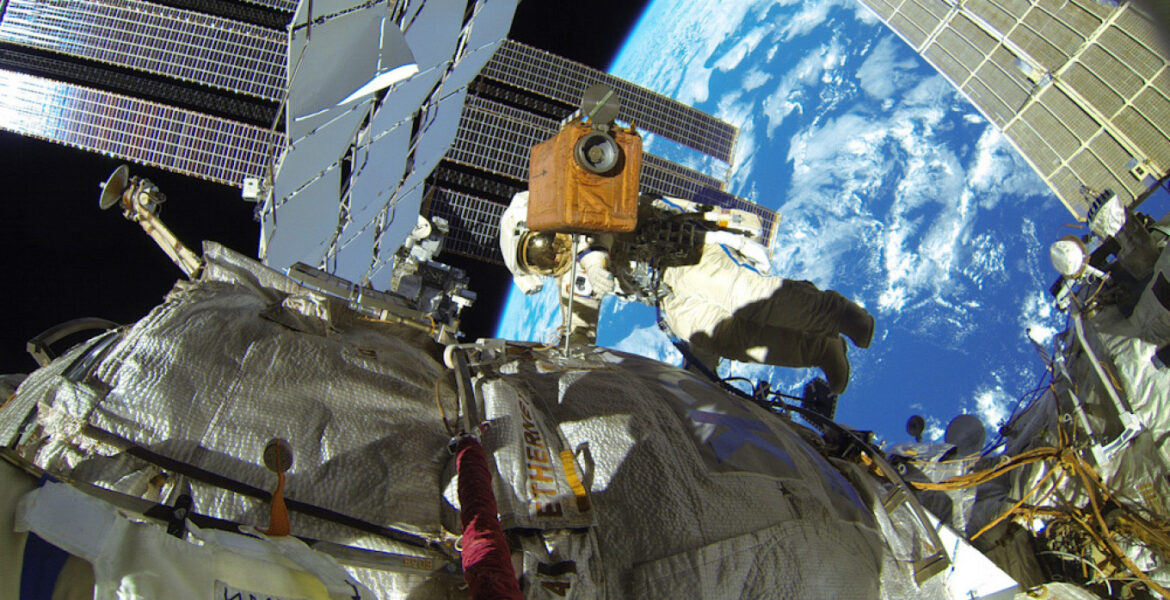The chief of Russian space agency Roscosmos, Dmitry Rogozin, said on Twitter that cooperation with the International Space Station (ISS) is ending until Western-led sanctions over Russia's invasion of Ukraine are lifted.
Rogozin said that Roscosmos will no longer work with NASA and the European Space Agency.
It follows weeks of threats, delays and cancelled projects from Roscosmos since a wave of sanctions were introduced against oligarchs linked to Russian President Vladimir Putin.
Rogozin previously said 'who would save the ISS?' if Russia were to withdraw from the project. It prompted US billionaire Elon Musk to reply: 'SpaceX' - the name of his private space company.
When a Twitter user asked the Tesla founder if this meant SpaceX would keep the ISS from falling onto Earth, Musk simply replied: 'Yes.'
The ISS is split into two halves, with life support coming from the US half, and propulsion, stopping it falling to Earth, coming from Russia's side.
Rogozin previously said their responsibilities on the ISS could fall to the US or Europe if it pulled out.
It comes after three Russian cosmonauts arrived at the ISS wearing yellow and blue flight suits in late March, which some people saw as a show of support for Ukraine and a humiliation for Putin's regime.
In a Twitter thread today, Rogozin said: "Sanctions from the US, Canada, the European Union and Japan are aimed at blocking financial, economic and production activities of our high-tech enterprises.
"The purpose of the sanctions is to kill the Russian economy, plunge our people into despair and hunger, and bring our country to its knees. It is clear that they will not be able to do this, but the intentions are clear.
"That is why I believe that the restoration of normal relations between partners in the International Space Station and other joint projects is possible only with the complete and unconditional lifting of illegal sanctions.
"Specific proposals of Roscosmos on the timing of the completion of cooperation within the framework of he ISS with the space agencies of the United States, Canada, the European Union and Japan will be reported to the leadership of our country in the near future."
The International Space Station (ISS) is the largest single structure ever put into space by humans and has been continuously occupied by a multi-national crew, mostly from the US and Russia, since November 2000.
It is not owned by one single nation and is a "co-operative programme" between Europe, the United States, Russia, Canada and Japan, according to the European Space Agency (ESA).
Rogozin said in a Twitter thread that he had written to each of the participating ISS countries' space agencies in regards to their respective governments' sanctions against Russia.
He shared their responses, including that of the European Space Agency, which said it would pass on the matter to all member states to discuss.
"By this time, the ISS could have died its own death," Rogozin said.
"Nevertheless, the position of our partners is clear: the sanctions will not be lifted.
"At the same time, fearing the destruction of cooperation on the ISS, where the role of Russia is of fundamental importance to ensure the viability and safety of the station, Western partners make it clear that in reality, sanctions in terms of work in the interests of the ISS will not work."
"I consider this state of affairs unacceptable."
Russia had already withdrawn cooperation with Germany on a space telescope - which it temporarily switched off - and experiments on the ISS.
Roscosmos also pulled out of a Soyuz sharing agreement with the European Space Agency launch partner Arianespace in French Guiana.
It has also threatened to withhold U.S.-built, UK-owned OneWeb satellites without a guarantee they won't be used for military purposes.


